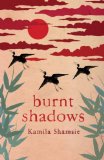
Shortlisted for the Orange Prize 2009
I can’t describe the plot of Burnt Shadows better than the blurb on the back cover of the book, so I have copied it here:
August 9th, 1945, Nagasaki. Hiroko Tanakasteps out onto her veranda, taking in the view of the terraced slopes leading up to the sky. Wrapped in a kimono with three black cranes swooping across the back, she is twenty-one, in love withthe man she is to marry, Konrad Weiss. In a split second, the world turns white. In the next, it explodes withthe sound of fire and the horror of realisation. In the numbing aftermath of a bomb that obliterates everything she has known, all that remains are the bird-shaped burns on her back, an indelible reminder of the world she has lost. In search of new beginnings, she travels to Delhi to find Konrad’s relatives, and falls in love with their employee Sajjad Ashraf, from who she starts to learn Urdu.
As the years unravel, new homes replace those left behind and old wars are seamlessly usurped by new conflicts. But the shadows of history – personal, political – are cast over the entwined worlds of two families as they are transported from Pakistan to New York, and in the novel’s astonishing climax, to Afghanistan in the immediate wake of 9/11.
Burnt Shadows is an epic book, spanning both generations and continents. There were many amazing sections in this book; the first chapter in particular was incredible, the subtle building of tension was brilliantly achieved, and the horror of the atomic blast, was sensitively written.
I loved the central character, Hiroko; she overcame so many tragedies, but remained a believable stalwart throughout. Some of her quotes were particularly thought provoking:
‘Sometimes I look at my son and think perhaps the less we have to “overcome” the more we feel aggrieved.’
The female characters in the book were far superior to the male ones. They seemed to have a depth, and realness lacking in all the male ones.
My main grievance with this book was that the ambitiousness was too great; trying to capture so many different cultures in one book, led to too much explanation, at the expensive of the flow of the story. In many places the book came across as contrived. The plot seemed to have been forced around major historic events: Nagasaki, Indian Partition and 9/11. These events were so far apart, both in time, and distance that it didn’t work for me. The credibility of the book just kept sliding away, the more I read. Would a 91-year-old lady really have travelled all the way from Asia to New York on her own, and then ‘run around’ New York like a person a quarter of her age?
Despite my criticisms there were many important issues raised by this book. The ambitiousness of this writing project deserves some recognition, and I wouldn’t be surprised if this won the Orange Prize. I’ll let you know once I’ve read all the other shortlisted books if I still think this is a contender.
Recommended for the first chapter, and a few other moments of genius, but be prepared to wade through some of the slower sections.
![]()
I noticed that some of Kamila Shamsie’s books have been shortlisted for the John Llewellyn Rhys Prize. Has anyone read any of her earlier books?
What did you think of this one? Do you think it might be a contender for the Orange prize this year?
